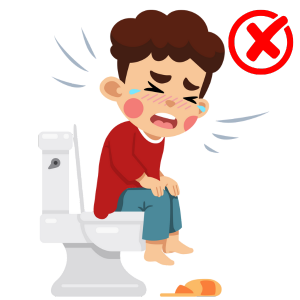
Dr Sathiya Ganesan’s
Empowering Children to Overcome Toileting Challenges with Confidence and Care
Toileting difficulties can be a major source of stress for both children and their families. Bedwetting, daytime wetting, and stool accidents are often misunderstood and stigmatised — but they are real medical and psychological conditions that can affect self-esteem, school performance, and emotional well-being.
Dr. Sathiya Ganesan, Consultant Child & Adolescent Psychiatrist, provides compassionate, developmentally informed care for Elimination Disorders, helping children gain confidence, independence, and control.
Understanding Elimination Disorders
Restoring Confidence and Clean Routines with Child-Friendly Support

Elimination disorders refer to conditions where children urinate or pass stool inappropriately — either voluntarily or involuntarily — beyond the age when toilet training is expected to be complete. These conditions are not a result of laziness or disobedience but may stem from delays in development, emotional stress, or underlying medical and psychological factors.
The two main elimination disorders are:
- Enuresis – repeated urination into bed or clothes (day or night), commonly known as bedwetting.
- Encopresis – repeated passage of stool in inappropriate places (clothes, floor), often associated with constipation or stool withholding.
These issues can cause embarrassment, social withdrawal, and conflict at home if not treated with sensitivity and expert care.
Common Signs of Enuresis and Encopresis in Children
- Bedwetting beyond age 5 (frequent or occasional)
- Daytime wetting during school or play
- Hiding soiled clothes or avoiding using the toilet
- Withholding urine or stool (fear of using toilet)
- Constipation, painful bowel movements
- Recurrent urinary tract infections
- Avoidance of sleepovers, camps, or social events
- Shame, irritability, or low self-esteem around toileting
These behaviors may increase during times of stress, transitions, or emotional upset. Early support helps prevent further distress and complications.
Child-Friendly Assessment and Diagnosis
Dr. Ganesan approaches each child with patience and empathy. His evaluation includes:
- A detailed developmental and toilet-training history
- Review of medical conditions (with input from pediatricians)
- Emotional and behavioral assessments
- Family and school context (e.g., stress, changes, expectations)
- Identification of any co-existing conditions like ADHD, anxiety, or trauma
This holistic approach ensures that both physical and emotional aspects are addressed in diagnosis and treatment.
Personalized Treatment Planning and Behavioral Interventions
Each treatment plan is tailored to the child’s age, emotional readiness, and physical needs. Goals may include:
- Establishing consistent toileting routines
- Addressing constipation or bladder dysfunction
- Reducing shame or punishment-based responses
- Reward systems to encourage progress
- Emotional regulation and coping techniques
Dr. Ganesan ensures that the child feels respected and involved in their own progress — building self-esteem and motivation.
Parent Coaching and Home Support Strategies
Parents are central to the success of treatment. Dr. Ganesan offers guidance to:
- Set realistic, age-appropriate expectations
- Avoid blame, punishment, or pressure
- Implement positive reinforcement techniques
- Create structured, stress-free toileting routines
- Address family conflicts or anxieties linked to the issue
With parent education, home becomes a safe place for growth rather than stress.
Coordination with Pediatricians and Therapists
When needed, Dr. Ganesan works closely with pediatricians and pediatric urologists to rule out or manage:
- Urinary tract infections
- Gastrointestinal issues (e.g., constipation, impaction)
- Neurological conditions affecting toileting
- Speech or developmental delays linked to communication difficulties
He also collaborates with occupational therapists or behavioral therapists if additional support is needed.
Play-Based Therapy and Emotional Support
For children with encopresis or toileting-related anxiety, therapy may include:
- Play therapy to reduce shame and build expression skills
- CBT-based techniques to challenge negative thoughts and fears
- Stress management skills to reduce performance pressure
- Behaviour charts and visual supports to track progress in a positive way
Therapy helps children view their body functions as normal, manageable, and nothing to feel ashamed of.
Online Consultations for Follow-Up and Parental Guidance
To ensure ongoing support, Dr. Sathiya Ganesan offers secure telepsychiatry services for:
- Progress monitoring
- Adjustment of behavior plans
- Parental check-ins
- School planning or caregiver education
This flexibility allows families to maintain continuity of care from the comfort of home.

Why Choose Dr. Sathiya Ganesan for Elimination Disorder Treatment?
Dr. Sathiya Ganesan brings a non-judgmental, child-first approach to a sensitive topic many families hesitate to talk about. With his clinical expertise and warm, encouraging manner, he creates a safe space where children feel supported and empowered.
His approach addresses both the physical and emotional aspects of elimination disorders, working closely with parents, schools, and pediatric specialists to achieve lasting results.
Support Your Child’s Path to Confidence and Clean Routines
If your child is struggling with bedwetting, stool accidents, or toileting challenges, you are not alone, and your child is not at fault. Reach out to Dr. Sathiya Ganesan today to start a respectful, evidence-based treatment journey toward independence and self-esteem.
What age is bedwetting considered a problem?
Bedwetting is common until age 5. If it continues beyond that, or if it causes distress or social avoidance, professional evaluation is recommended.
Is encopresis a behavioral problem or a medical issue?
Encopresis often involves both — it may start from constipation or withholding but can develop into behavioral cycles. Treatment includes medical and emotional support.
Can anxiety cause bedwetting or stool accidents?
Yes, emotional stress, transitions, or trauma can trigger or worsen elimination issues. Treating the underlying anxiety is often part of recovery.
Should I punish my child for wetting the bed or soiling?
No. Punishment increases shame and anxiety, worsening the issue. Dr. Ganesan helps parents use positive reinforcement and supportive routines instead.
Can online therapy help with elimination disorders?
Yes. Parent consultations, therapy planning, and follow-ups can be effectively managed through telepsychiatry. Dr. Ganesan offers secure, flexible virtual care.


